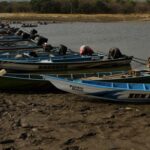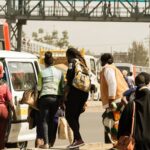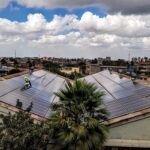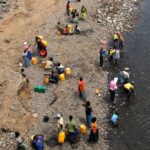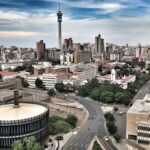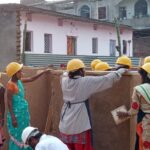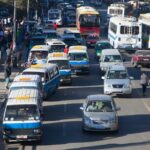Posts tagged with 'South Africa'
Bogotá, Colombia is in the throes of a water crisis. After several months of dry weather caused by El Niño, the Chingaza reservoir system, which provides 70% of Bogotá’s water, reached its lowest level in history. The city’s over 8 million residents are ...

Over the past several months, the climate pattern El Niño has disrupted different regions and sectors across the world. Zimbabwe recently declared a state of disaster, due largely to El Niño-induced drought. The city government in Bogotá, Colombia, announced water rationing as reservoir levels ...

At COP28, global climate leaders congregated in Dubai for the annual opportunity to review countries’ progress on emissions reductions and to increase climate ambition. One of the conference’s focal points was how to rapidly and equitably transition away from fossil ...

For a woman living in an African city, public transport can be a daunting experience. Women usually plan their trips in advance, and consider a multitude of factors before setting out: What is the safest way to reach the bus ...

2023 was hot but ultimately hopeful. The past year saw record-breaking temperatures and an onslaught of extreme weather events like droughts, floods and heatwaves. Cities often bore the brunt of these conditions, exacerbated by the urban heat island effect: when ...

Public transport is one of the best, most cost-effective solutions available to address today’s climate and development challenges. Buses and trains can reduce greenhouse gas (GHG) emissions by up to two-thirds per passenger, per kilometer compared to private vehicles. The UN’s latest ...

Over 50% of all transport-related emissions come from high-income countries, where people are more likely to own and depend on personal vehicles. Meanwhile, less than 1% is generated by low-income countries in regions like sub-Saharan Africa and Latin America. In these ...

In Africa, as elsewhere, advances in computing power, data storage, and sensor and satellite technologies have unleashed unprecedented opportunities but also challenges. The mobile phone has become a powerful tool for generating vast amounts of data. This data can, in ...

Climate change is already having a significant impact on Africa’s ecosystems, economy and society. This year alone, 1.8 million Africans were displaced during a prolonged drought, the Democratic Republic of Congo experienced catastrophic flooding, and Cyclone Freddy left a trail of destruction in Malawi and Mozambique. ...

New data from WRI’s Aqueduct Water Risk Atlas show that 25 countries — housing one-quarter of the global population — face extremely high water stress each year, regularly using up almost their entire available water supply. And at least 50% of the ...

The minibus taxi (MBT) industry is the backbone of South Africa’s public transportation system with a fleet of approximately 250,000 vehicles, operated by thousands of providers, employing some 600,000 drivers. MBTs account for 80% of all journeys taken by taxi ...

South Africa’s cities are economic engines, drawing workers across the country and the continent. Of the country’s 58.8 million population, 68% live in urban areas. Between 2000 and 2014, urban area in South Africa expanded by 1,464 km2. Population projections ...

The latest UN climate conference, COP27 in Sharm el Sheikh, Egypt, was a significant one for cities in many respects. Delegates established a new fund to help vulnerable countries deal with loss and damages from climate impacts, and some of ...

Cities have never been more engaged on climate action. At the 2021 UN Climate Change Conference (COP26), more than 1,100 cities representing a quarter of global CO2 emissions signed up to the Cities Race to Zero. In doing so, they committed ...

The Digital Transport for Africa (DT4A) initiative, led by WRI and partners and funded by the French Development Agency (AFD), has selected four winners of the first-ever DT4A Innovation Challenge. From private companies to universities and NGOs, these initiatives are helping to shift ...








